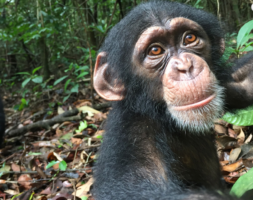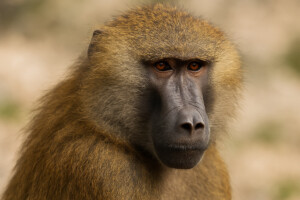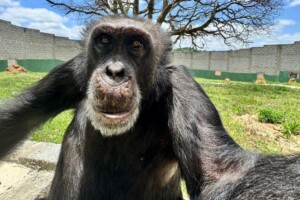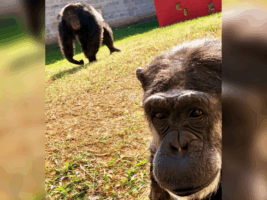SLES TO CHIMPANZEES AND SANCTUARIES IN EUROPE
FROM AFRICA
Today we found ourselves in a complex moment. Decades ago a lot of primates victims of international illegal trade based on African and Asian countries arrived in
Behind a chimpanzee that made people laugh in a zoo or in a circus it was always found a tragic story. These beings not only had suffered with the sudden separation from their mothers when they were still in breast feeding but also were transported in very low conditions from very far away of the forest that witnessed their birth. In a few time the mystery and beauty of the forest converted on a reduced space with a can to drink from, another to eat and a glass, which enables that millions of strange eyes, replacing their mothers\’, observe every single movement they made, how they pee, their faeces, how they copulate, if they have the lucky of having a partner. Definitely, an intimacy forcibly exchanged for a certain quantity of fruit and water per day.
Millions of families of these incredible beings who are almost humans were destroyed to satisfy the humane soberby. As result, nowadays, due to the international law and to the development of CITES (Convention on Threatened to Extinction Species, signed by
Great primates can not enter
This year\’s approval of the great primates\’ rights proposal by the Spanish Parliament, defended by PGS – GAP, has something in common with the answer for this question.
Nowadays nobody agrees with the exhibition of disabled people in a party, with the subtitle "come and see the crippled clown", to lead an uneducated audience to laugh. Social ethics evolution converted this kind of act in a immorality and it is not practiced in
When the Government recognizes the Parliament\’s proposal suggested by PGS – GAP, a lot of great primates rights are going to be approved. This recognition will make us advance in our respect and recognition of our closest evolution partners. And this will make us better person, without any doubt.
But, when this moment arrives, it is going to be necessary to analyze deeply this concept, to understand the real meaning of these rights. One of them is clearly about the right to freedom. The unique justification for a great primate to be jailed in captivity is the incapacity to survive by his own, needing our help. With this affirmation we enter in the delicate area of the subjective evaluation. What makes a chimpanzee do not be able to survive by his ownω Is it true that a captive chimpanzee will never be able to know what it is to be freeω
The great capacity of readaptation of these beings, due to their cognitive abilities and their survival instinct, put these questions in doubt.
Currently different projects for release of great primates in their natural habitat, African and Asian, are being developed. Recently a chimpanzee Sanctuary in
Back to these great primates that are prisoners in enclosures that are not so good all over
The best European enclosures to primates are still limited areas: from the yard to the bedroom, from the bedroom to the yard, from the yard to the bedroom… something that makes us think about the claustrophobics human jails. In captivity the great primates spend their time with a little vegetation here, wood platforms there, a slide on the other side… In the jails, the prisoners try to spend their time playing cards, watching TV, playing basketball, with the difference that the primates are not guilty for anything.
The option of transferring these chimpanzees to the isles in African dense forests can be seen as a very expensive and extremely complex solution. But if we really believe that we won them something, that we are really regretted for having slaughtering their families e stole their freedom, we should hold hands to them and take them back to their home, which is the forest. It is possible that one thinks that this is only a dream, but there was a day that the crippled clown\’s dreams became real and their reality changed forever.
There is no hope without dreams; there is no evolution without hope.
NOTE: Fernando Turno lives in Congo. He is a PGS (GAP)
Pedro A. Ynterian
GAP Project International

 Español
Español
 Português
Português








